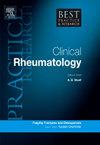环境因素与风湿病。
IF 4.8
2区 医学
Q1 RHEUMATOLOGY
Best Practice & Research in Clinical Rheumatology
Pub Date : 2025-05-01
DOI:10.1016/j.berh.2025.102053
引用次数: 0
摘要
风湿病的发病机制和病理生理复杂,依赖于不同因素的相互作用。普遍的观点是,病理性自身免疫在遗传易感个体暴露于环境触发后发展。这突出了认识和解构环境因素在风湿病中的影响的重要性。在过去的几十年里,已经确定了几个具有有害或保护作用的因素,这些因素不仅影响疾病的发病,而且影响其自然历史。吸烟已被确定为最强的环境风险因素之一,与几种风湿性疾病的疾病发展和严重程度相关,包括类风湿关节炎(RA)、系统性红斑狼疮(SLE)和脊椎关节病。此外,其他空气污染物,如二氧化硅、溶剂、石棉和金属是公认的风湿性疾病的危险因素。然而,其他一些因素的影响并不直接,其中一个显著的例子是饮酒。酒精既具有抗炎作用,也具有抗炎作用,对风湿性疾病的影响因饮酒的数量和频率以及性别和种族而异。同样,紫外线照射与SLE的高风险相关,但与RA的风险较低相关。微生物暴露与自身免疫之间的关系也很复杂:虽然一些感染因子会增加风湿病的风险,但人们普遍认为,特别是在免疫系统发育期间,较少接触微生物因子会增加自身免疫的风险。此外,近年来,人们的关注焦点已经转向人体微生物组,因为器官特异性微生物组组成的改变被认为是免疫介导性疾病发病的早期参与者。本综述的目的是强调最相关的环境因素及其在风湿病学中的作用,特别关注所提出的病理生理效应及其与临床结果的相关性。本文章由计算机程序翻译,如有差异,请以英文原文为准。
Environmental factors and rheumatic diseases
The pathogenesis and pathophysiology of rheumatic diseases is complex and relies on the interaction of different factors. The common view is that the pathological autoimmunity develops in genetically predisposed individuals upon exposure to an environmental trigger. This highlights the importance of recognizing and deconstructing the effects of environmental agents in rheumatic diseases. Several factors have been identified in the last decades, with detrimental or protective effects, impacting not only on disease onset, but also on its natural history. Cigarette smoking has been identified as one of the strongest environmental risk factors, being associated with disease development and severity for several rheumatic diseases, including rheumatoid arthritis (RA), systemic lupus erythematosus (SLE), and spondyloarthropathies. Moreover, other airborne pollutants, such as silica, solvents, asbestos and metals are recognized risk factors for rheumatic diseases. The effect of some other agents is however not straightforward, of which a remarkable example is alcohol consumption. Alcohol has been associated with both pro- and anti-inflammatory effects, exerting a variable effect on rheumatic diseases depending on quantity and frequency of consumption, as well as sex and ethnicity. Similarly, ultraviolet light exposure has been associated with a higher risk of SLE but lower risk of RA. The relationship between microbial exposure and autoimmunity is also complex: while some infectious agents increase the risk of rheumatic diseases, it is widely accepted that less exposure to microbial agents, particularly during immune system development, increases the risk of autoimmunity. Furthermore, in recent years the spotlight has switched to the human microbiome, as alterations in organ-specific microbiome composition are anticipated to be early participants in the onset of immune-mediated illnesses. The aim of this review is to highlight the most relevant environmental factors and their role in Rheumatology, with a specific focus on proposed pathophysiological effect and correlation with clinical outcomes.
求助全文
通过发布文献求助,成功后即可免费获取论文全文。
去求助
来源期刊
CiteScore
9.40
自引率
0.00%
发文量
43
审稿时长
27 days
期刊介绍:
Evidence-based updates of best clinical practice across the spectrum of musculoskeletal conditions.
Best Practice & Research: Clinical Rheumatology keeps the clinician or trainee informed of the latest developments and current recommended practice in the rapidly advancing fields of musculoskeletal conditions and science.
The series provides a continuous update of current clinical practice. It is a topical serial publication that covers the spectrum of musculoskeletal conditions in a 4-year cycle. Each topic-based issue contains around 200 pages of practical, evidence-based review articles, which integrate the results from the latest original research with current clinical practice and thinking to provide a continuous update.
Each issue follows a problem-orientated approach that focuses on the key questions to be addressed, clearly defining what is known and not known. The review articles seek to address the clinical issues of diagnosis, treatment and patient management. Management is described in practical terms so that it can be applied to the individual patient. The serial is aimed at the physician in both practice and training.

 求助内容:
求助内容: 应助结果提醒方式:
应助结果提醒方式:


